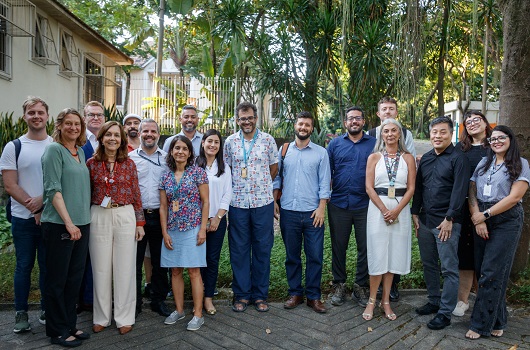Fiocruz receives representatives from the WHO's epidemiological intelligence hub
14/05/2024
Ana Paula Blower (Fiocruz News Agency)
On Thursday (5/2), Fiocruz received a delegation from the Global Hub for Pandemic and Epidemic Intelligence of the World Health Organization (WHO) for a meeting on the current stage and next steps of the bilateral cooperation signed between the institutions last year. The Vice President of Research and Biological Collections (VPPCB/Fiocruz), Maria de Lourdes Oliveira, received the delegation, led by the Unit Head of Insights and Analytics (IAA), Julia Fitzner.
WHO and Fiocruz representatives at Manguinhos Campus (photo: Pedro Linger)
In May 2023, Fiocruz and the WHO signed a memorandum of understanding laying the foundations for the international cooperation to be developed between the Foundation and the hub, based in Berlin. The collaboration focuses on developing and strengthening global surveillance, preparing for epidemics and pandemics and integrating surveillance data. The agreement runs for five years and covers areas such as surveillance, research, technological development, information and communication.
During the meeting, Vice President Maria de Lourdes gave an institutional presentation of Fiocruz highlighting the complexity of the Foundation, its institutional missions and the various areas where cooperation with the Hub could be expanded, such as surveillance, vector control and other early warning systems. In this sense, she highlighted, among others, the importance of the monitoring and analytics work of InfoGripe, focused on respiratory viruses, InfoDengue, for arboviruses; and the data analytics by the Center for the Integration of Data and Knowledge for Health (Cidacs/Fiocruz), which are already part of the hub's activities.
"We have many opportunities for cooperation and other Fiocruz groups can make key contributions in the context of epidemiological intelligence. For us, it is important to listen to them so that we can implement ongoing activities and add new Fiocruz initiatives to the Hub," said the vice president. In June, Maria de Lourdes and the coordinator of Health Surveillance and Reference Laboratories, Tania Fonseca, will visit the Charité, the Robert Koch Institute and the hub to continue discussions on cooperation.
The Unit Head of Insights and Analytics (IAA), Julia Fitzner, also gave a presentation about the Berlin Hub. Like Maria de Lourdes, she drew attention to the areas in which Fiocruz could expand or initiate new cooperation, such as surveillance. She stressed the importance of not only anticipating new global health emergencies, but also being prepared for when and if they happen. To this end, she drew attention to the value of monitoring systems and data analytics that can guide authorities in their decision-making – areas in which Fiocruz has experience and currently works in.
Fitzner emphasized the value of networks, such as the Hub and its partnerships, which are built and strengthened before a period of crisis. "We want to stop the worst before it happens, and if the worst does happen, that we can be in a position to make the best public health decisions, to avoid bad ones," Fitzner commented. "Before we only responded to crises. The ideal now is to innovate, to use the lessons learned. And networks are very important so that we can move forward before the crisis happens."
Negotiations began in March 2022
Fiocruz's participation in the WHO hub began to be designed in March 2022, when Ihekweazu visited the Foundation and invited the institution to be a partner in the center, which at the time was being set up in the German capital. Four months later, in July last year, the director of the WHO's Department of Health Emergency Information & Risk Assessment, Oliver Morgan, was at Fiocruz to discuss how this joint action would take place. At the time, the idea was for the Foundation to share its experience with countries in the Americas and Portuguese language countries in Africa.


